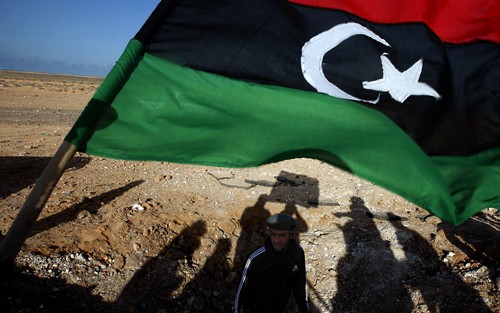WASHINGTON — The Obama administration is drawing careful limits on its potential military involvement in the increasingly bloody struggle between the Libyan government and rebel forces, despite growing calls for Western intervention.
Administration officials, while stepping up efforts to help refugees fleeing Libya, say they will provide only secondary military aid to the rebels, such as electronic jamming of government communications, unless an increase in civilian killings by Libyan leader Moammar Gadhafi’s forces prompts an international consensus for stronger steps.
Even then, officials say, they would prefer the U.S. play a supporting role in an international military coalition.
This reticence has placed the U.S. in the position of doing little more than old-fashioned saber rattling, intended to show the Gadhafi government that Washington still could take military action. The Pentagon has moved two ships near Libya and, on Monday, NATO increased the number of flights by its AWACS surveillance planes that track flights of military planes.
But the U.S. has repeatedly downplayed the possibility of a no-fly zone, which the rebels have implored the West to institute to prevent air attacks against them.
U.S. officials acknowledge that Gadhafi’s air force could be an important factor in the war but add that, up to now, he hasn’t been using it for intense attacks on civilians.
The cautious approach reflects the view that another American-led invasion of an Arab state would dangerously deepen the antagonism between the U.S. and the Muslim world. Many senior administration officials, at the Pentagon and elsewhere, are also worried about plunging into what could be a protracted civil war when the U.S. military is overstretched in Afghanistan and Iraq.
Western allies could provide the rebels with intelligence about Gadhafi’s forces to help them avoid ambushes and fight smarter, said Jeffrey White of the Washington Institute for Near East Policy. They also could provide ammunition, fuel, medical help, communications gear and weapons training, he said.
Although U.S. officials say they are working with NATO allies on potential military contingencies, the administration has repeatedly trotted out senior officials over the last two weeks to convey reluctance about the military options.
U.S. officials have made clear that they want American allies to take the lead on the diplomatic side as well. This week, French and British diplomats put forth at the U.N. Security Council a proposed resolution for the U.N. to bless a no-fly zone.
But it appears that the international support the administration says is needed for military action won’t come soon, if at all.
Meanwhile, U.S. officials are putting their highest priority on trying to end the war by convincing Gadhafi’s aides, generals and even business partners that they face war crimes charges and a bleak future for collaborating with him.
The White House said on Monday that the U.S. was using all of its intelligence capabilities — presumably including electronic eavesdropping and satellite surveillance — to identify who is collaborating with Gadhafi.
U.S. diplomats have been reaching out to Libyan rebel leaders for the last 10 days, trying to learn more about them, what their goals are and whether they could work as partners with the U.S. and allies. But U.S. officials insist that they are far from providing arms to the Libyan rebels, which they noted is prohibited by a U.N. Security Council resolution adopted last month to sanction Gadhafi and his family members.
———
(Staff writer David S. Cloud contributed to this report.)









